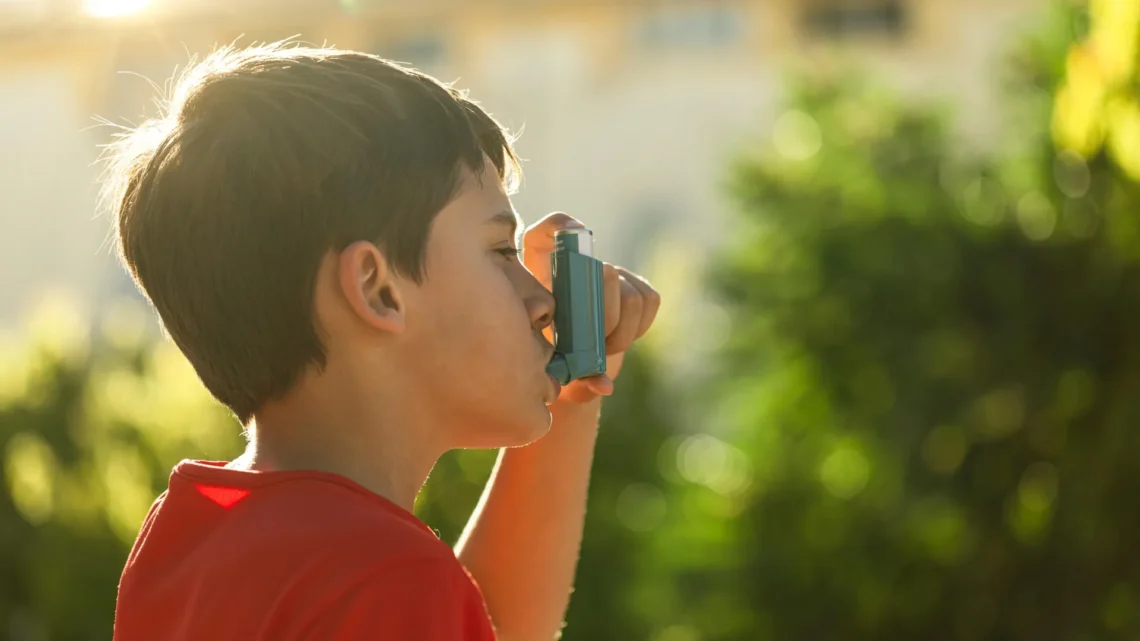Revolutionizing Asthma Treatment for Children
Findings from a trial comparing the real-world effectiveness of asthma inhalers could reshape how children with asthma are treated.
Study Overview
In the first randomized controlled trial investigating the efficacy of a 2-in-1 inhaler as the primary reliever therapy for children aged 5 to 15, an international team discovered that this combined treatment is more effective than salbutamol, the current standard for asthma symptom relief in children, while posing no additional safety concerns.
Key Findings
The trial results indicate that utilizing a single 2-in-1 anti-inflammatory reliever inhaler, which combines the inhaled corticosteroid (ICS) budesonide with the fast-acting bronchodilator formoterol, led to a significant reduction in asthma attacks among children—averaging a 45% decrease compared to the commonly used salbutamol inhaler.
Asthma attacks can be life-threatening in children, making their frequency and severity a public health priority.
Current Treatment Protocols
Though the 2-in-1 budesonide-formoterol inhaler is widely recommended as the preferred reliever treatment for adults, it is still uncommon for children to be prescribed this option.
Researchers believe these findings, published on September 27 in The Lancet, provide essential evidence for aligning global asthma guidelines for children with those for adults, potentially benefiting millions of children worldwide with mild-to-moderate asthma.
Study Design and Results
The CARE study (Children’s Anti-inflammatory REliever) was designed and led by the Medical Research Institute of New Zealand (MRINZ), in collaboration with Imperial College London, University of Otago Wellington, Starship Children’s Hospital, and the University of Auckland. The study recruited 360 participants across New Zealand, randomly assigning them to receive either budesonide-formoterol or salbutamol for on-demand symptom relief, over the course of one year.
The findings revealed that the budesonide-formoterol inhaler resulted in a lower rate of asthma attacks, with 0.23 attacks per participant annually, compared to 0.41 for those using salbutamol. This suggests that for every 100 children with mild asthma switched from salbutamol to the 2-in-1 inhaler, there would be an estimated 18 fewer asthma attacks each year. Importantly, this study confirmed the approach’s safety, reporting no significant differences in children’s growth, lung function, or overall asthma control between the two treatment groups.
Research Implications
Dr. Lee Hatter, the study’s lead author and Senior Clinical Research Fellow at MRINZ, commented: “This is a crucial advancement in addressing the evidence gap between asthma management in adults and children. For the first time, we have demonstrated that the budesonide-formoterol 2-in-1 inhaler, used as needed for symptom relief, can significantly reduce asthma attacks in children with mild asthma. This evidence-based treatment could lead to improved outcomes for children globally.”
Professor Richard Beasley, the Director of MRINZ and senior author of the study, stated: “Implementing these findings could transform asthma management worldwide. The evidence that budesonide-formoterol is more effective than salbutamol in preventing asthma attacks for children with mild asthma may redefine global standards in asthma management.”
The Burden of Asthma in Children
The burden of asthma affects an estimated 113 million children and adolescents globally. The recent study builds upon previous research conducted by MRINZ that has shaped international asthma treatment guidelines, leading to the recommended use of the 2-in-1 ICS-formoterol inhaler as the preferred reliever treatment for adults.
Incorporating the findings from the CARE study into global asthma treatment strategies could reduce disparities in care, ensuring wider access to effective, evidence-based treatments for children.
Limitations of the Study
However, the authors recognized certain limitations within the clinical trial. Conducted during the COVID-19 pandemic, stringent public health measures and reduced circulation of respiratory viruses contributed to a lower than anticipated rate of severe asthma attacks. Additionally, challenges in identifying asthma attacks in children and potential biases from a lack of treatment blinding were acknowledged. Nevertheless, the study’s real-world design renders its findings applicable to clinical practice.
Global Significance
Professor Andrew Bush from Imperial College London, a senior respiratory pediatrician and co-author of the study, expressed, “Experiencing an asthma attack can be frightening for both children and their parents. We are pleased to demonstrate that an inhaler that significantly reduces attacks—previously a breakthrough for adults—is also safe for children with mild asthma. We believe this will revolutionize asthma care globally.”
Professor Helen Reddel, Chair of the Science Committee for the Global Initiative for Asthma (GINA), emphasized the global importance of the study, noting that it addresses a critical gap in asthma management worldwide. “Asthma attacks profoundly affect children’s physical, social, and emotional development, making prevention a top priority for asthma care. Childhood is also when lifelong medication habits are formed, particularly reliance on traditional treatments that merely relieve symptoms.”
Professor Bob Hancox, Medical Director of the New Zealand Asthma and Respiratory Foundation, remarked, “This study holds significant relevance for children with mild asthma. We have understood for some time that 2-in-1 budesonide/formoterol inhalers are superior to traditional reliever treatments for adults; however, this is the first evidence establishing their efficacy in children. This research has the potential to alleviate the asthma burden for many children, allowing them and their families to breathe easier.”
Study Key Points
- The CARE study is the first randomized controlled trial comparing ICS-formoterol anti-inflammatory reliever inhaler treatment with salbutamol reliever inhaler treatment in children aged five to fifteen with asthma.
- Budesonide-formoterol demonstrated a significant reduction in asthma attacks, with a 45% decrease in the rate of attacks compared to salbutamol (0.23 vs 0.41 attacks per participant per year; relative rate 0.55, 95% CI 0.35-0.86, p=0.01).
- These findings align with established benefits observed in adults, where ICS-formoterol has become the preferred reliever treatment for asthma management.
- The study found no safety concerns related to the use of a combined inhaled steroid treatment in children, with no adverse effects on growth or lung function.
- This study offers compelling evidence that transitioning from a salbutamol reliever inhaler to a budesonide-formoterol reliever inhaler can mitigate asthma attacks in children as young as five, potentially leading to a global shift in asthma treatment.
Key Health Takeaway
The CARE study highlights the significant potential of the 2-in-1 budesonide-formoterol inhaler as a superior reliever therapy for children with mild asthma, revealing its effectiveness in reducing asthma attacks while maintaining safety. This breakthrough could lead to essential changes in pediatric asthma management worldwide.
The study was made possible by the generous support of the Health Research Council of New Zealand, Cure Kids (New Zealand), and the Barbara Basham Medical Charitable Trust managed by Perpetual Guardian. Symbicort Rapihalers for the trial were provided by AstraZeneca.





